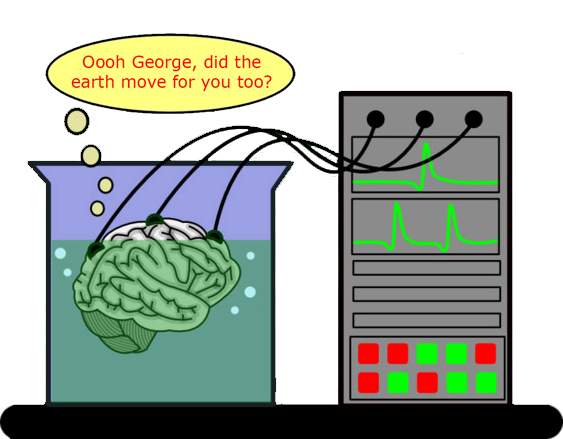IMAGINE...
...that your brain is floating in a jar and wired up to a super-computer. You can see, hear, taste, smell and touch - but it's all an illusion: a virtual reality - think The Matrix.
Would you have any way of knowing that you're only a brain in a jar?

MORE BOGGLING!:
Now (if you dare) try boggling your brain more:
A 'real' experiment carried out just over a decade ago at University College London caused it's participants to have out-of-body-experiences (OOBEs).
"This was a bizarre, fascinating experience for the participants—it felt absolutely real for them and was not scary. Many of them giggled and said 'Wow, this is so weird!'“
| DON'T KNOCK IT BEFORE YOU'VE TRIED IT: The above thought experiment is typical of the present day Zeitgeist: materialistic and reductionist where the brain's workings is compared to that of a computer. The second 'real' experiment confounds this perception if the experimenters are to be believed that their experience was 'absolutely real'! |
 |
SO WHAT IS REAL?
Many neurologists and scientists claim that our mind's are produced by the brain which is in a dark box called your skull and can never see a painting in a gallery, hear a song, smell fresh-cut grass, taste claret or stroke a cat - it can only interpret the signals it receives - it's actually impossible to know what is 'out there'!
THINKING OUTSIDE THE BOX:
Some neurologists and scientists, however, are suggesting that minds and brains are separate, and that trying to discover how the brain produces the mind is like trying to discover how a television produces the picture. We all know that the television is a receiver that processes information carried within electromagnetic waves. It's just as much a folly pulling a brain apart to see where consciousness comes from just as it is pulling apart a TV to see where the picture comes from!
COMPUTERS ARE NOT LIKE BRAINS:
Computers have no sense of agency or subjective experience - one day a computer may pass the Turing test, but it'll never be anything other than calculating machine!
Whilst computers generate and process information, brains are very different: consider the possibility that, instead, they receive and process information.
Well before Western scientism became the prevailing intellectual, moral, and cultural climate of our era Eastern Contemplative practitioners reported consciousness transcending the physical body; hence the brain doesn't produce consciousness, rather: the brain is within consciousness.
WHAT IS THE NATURE OF MIND?:
Rupert Sheldrake believes that our perceptions are not rooted in the inside of our heads but extend beyond:
I am convinced that the way forward is to treat fields of the mind as a testable scientific hypothesis rather than a philosophical theory. When I look at something, my perceptual fields "clothe" what I am looking at. My mind touches what I am seeing. Therefore I might be able to affect another person just by looking. If I look at someone from behind when she cannot hear me, or see me, and does not know I am there, can she feel my gaze?
Science Set Free by Rupert Sheldrake. Copyright
© 2012 by Rupert Sheldrake. Published by Crown Archetype/ Deepak Chopra
Books, a division of Random House, Inc.
He's not alone - many philosophical and religious traditions believe that mind and body are distinct; that the experience of mind is non-physical and non-local.